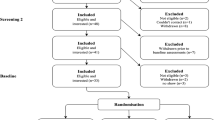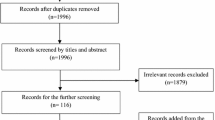Abstract
This review aims to summarize the theory of cognitive behavioural therapy (CBT) as well as the current evidence for whether CBT can be beneficial for patients with heart failure (HF). Depression and/or anxiety are common in HF patients. However, participation in disease management programmes does not seem to be beneficial for these problems. CBT, which focuses on the identification and changing of dysfunctional beliefs and thoughts and on behaviour therapy, is a possible treatment option. The number of CBT studies on HF is small and they are often not designed as randomized controlled trials. However, the studies on HF indicate that CBT can decrease depression as well as anxiety and suggest that relaxation exercises with elements of CBT may decrease symptom burden. Before implementation in clinical practice, more knowledge is needed about how CBT programmes should be designed, where CBT should be delivered and who should deliver CBT.
Similar content being viewed by others
References
Papers of particular interest, published recently, have been highlighted as: • Of importance
Michaud CM, Murray CJ, Bloom BR. Burden of disease—implications for future research. JAMA. 2001;285(5):535–9.
Graham I, Atar D, Borch-Johnsen K, Boysen G, Burell G, Cifkova R, et al. European guidelines on cardiovascular disease prevention in clinical practice: executive summary. Atherosclerosis. 2007;194(1):1–45. doi:10.1016/j.atherosclerosis.2007.08.024.
Stewart S, MacIntyre K, Hole DJ, Capewell S, McMurray JJ. More ‘malignant’ than cancer? Five-year survival following a first admission for heart failure. Eur J Heart Fail. 2001;3(3):315–22.
McMurray JJ, Adamopoulos S, Anker SD, Auricchio A, Bohm M, Dickstein K, et al. ESC Guidelines for the diagnosis and treatment of acute and chronic heart failure 2012: the task force for the diagnosis and treatment of acute and chronic heart failure 2012 of the European Society of Cardiology. Developed in collaboration with the Heart Failure Association (HFA) of the ESC. Eur Heart J. 2012;33(14):1787–847. doi:10.1093/eurheartj/ehs104.
Johansson P, Dahlstrom U, Brostrom A. Factors and interventions influencing health-related quality of life in patients with heart failure: a review of the literature. Eur J Cardiovasc Nurs. 2006;5(1):5–15.
Dickstein K, Cohen-Solal A, Filippatos G, McMurray JJV, Ponikowski P, Poole-Wilson PA, et al. ESC Guidelines for the diagnosis and treatment of acute and chronic heart failure 2008: the task force for the diagnosis and treatment of acute and chronic heart failure 2008 of the European Society of Cardiology. Developed in collaboration with the heart failure association of the ESC (HFA) and endorsed by the European Society of Intensive Care Medicine (ESICM). Eur J Heart Fail. 2008;10(10):933–89.
Pattenden JF, Roberts H, Lewin RJ. Living with heart failure; patient and carer perspectives. Eur J Cardiovasc Nurs. 2007;6(4):273–9. doi:10.1016/j.ejcnurse.2007.01.097.
Muzzarelli S, Leibundgut G, Maeder MT, Rickli H, Handschin R, Gutmann M, et al. Predictors of early readmission or death in elderly patients with heart failure. Am Heart J. 2010;160(2):308–14. doi:10.1016/j.ahj.2010.05.007.
Kheirbek RE, Alemi F, Citron BA, Afaq MA, Wu H, Fletcher RD. Trajectory of illness for patients with congestive heart failure. J Palliat Med. 2013;16(5):478–84. doi:10.1089/jpm.2012.0510.
Welstand J, Carson A, Rutherford P. Living with heart failure: an integrative review. Int J Nurs Stud. 2009;46(10):1374–85. doi:10.1016/j.ijnurstu.2009.03.009.
Rutledge T, Reis VA, Linke SE, Greenberg BH, Mills PJ. Depression in heart failure a meta-analytic review of prevalence, intervention effects, and associations with clinical outcomes. J Am Coll Cardiol. 2006;48(8):1527–37.
Dekker RL, Lennie TA, Doering LV, Chung ML, Wu JR, Moser DK. Coexisting anxiety and depressive symptoms in patients with heart failure. Eur J Cardiovasc Nurs. 2014;13(2):168–76. doi:10.1177/1474515113519520.
Johansson P, Brostrom A. Insomnia is associated to depressive symptoms in patients with chronic heart failure. Open J Nurs. 2013;3:33–41. doi:10.4236/ojn.2013.31005.
Muller-Tasch T, Peters-Klimm F, Schellberg D, Holzapfel N, Barth A, Junger J, et al. Depression is a major determinant of quality of life in patients with chronic systolic heart failure in general practice. J Card Fail. 2007;13(10):818–24.
Johansson P, Lesman-Leegte I, Lundgren J, Hillege HL, Hoes A, Sanderman R, et al. Time-course of depressive symptoms in patients with heart failure. J Psychosom Res. 2013;74(3):238–43. doi:10.1016/j.jpsychores.2012.09.019.
Fulop G, Strain JJ, Stettin G. Congestive heart failure and depression in older adults: clinical course and health services use 6 months after hospitalization. Psychosomatics. 2003;44(5):367–73.
O'Connor CM, Jiang W, Kuchibhatla M, Silva SG, Cuffe MS, Callwood DD, et al. Safety and efficacy of sertraline for depression in patients with heart failure: results of the SADHART-CHF (Sertraline Against Depression and Heart Disease in Chronic Heart Failure) trial. J Am Coll Cardiol. 2010;56(9):692–9. doi:10.1016/j.jacc.2010.03.068. This is the largest study that have evaluated the effect of SSRI on depression in patients with heart failure.
Cuijpers P, Berking M, Andersson G, Quigley L, Kleiboer A, Dobson KS. A meta-analysis of cognitive-behavioural therapy for adult depression, alone and in comparison with other treatments. Une méta-analyse de la thérapie cognitivo-comportementale pour la dépression adulte, seule et en comparaison avec d'autres traitements. 2013;58(7):376–85.
Hofmann SG, Smits JA. Cognitive-behavioral therapy for adult anxiety disorders: a meta-analysis of randomized placebo-controlled trials. J Clin Psychiatry. 2008;69(4):621–32.
Montgomery P, Dennis J. Cognitive behavioural interventions for sleep problems in adults aged 60+. Cochrane Database Syst Rev. 2003;1, CD003161. doi:10.1002/14651858.CD003161.
Tallis F. Changing minds the history of psychotherapy as an answer to human suffering. 1998.
Beck AT, Young JE. Cognitive therapy of depression. Guilford clinical psychology and psychotherapy series. New York: Guilford Press; 1979.
Hofmann SG, Asnaani A, Vonk IJ, Sawyer AT, Fang A. The efficacy of cognitive behavioral therapy: a review of meta-analyses. Cogn Ther Res. 2012;36(5):427–40. doi:10.1007/s10608-012-9476-1.
Ehde DM, Dillworth TM, Turner JA. Cognitive-behavioral therapy for individuals with chronic pain: efficacy, innovations, and directions for research. Am Psychol. 2014;69(2):153–66. doi:10.1037/a0035747.
Tolin DF. Is cognitive-behavioral therapy more effective than other therapies? A meta-analytic review. Clin Psychol Rev. 2010;30(6):710–20. doi:10.1016/j.cpr.2010.05.003.
Andersson G. The Internet and CBT: a clinical guide. CRC Press. Taylor and Francis Group; 2014.
Gary RA, Dunbar SB, Higgins MK, Musselman DL, Smith AL. Combined exercise and cognitive behavioral therapy improves outcomes in patients with heart failure. J Psychosom Res. 2010;69(2):119–31. doi:10.1016/j.jpsychores.2010.01.013. This study evaluated the combined effect of CBT and physical exercise on depression in patients with heart failure.
Dekker RL, Moser DK, Peden AR, Lennie TA. Cognitive therapy improves three-month outcomes in hospitalized patients with heart failure. J Card Fail. 2012;18(1):10–20. doi:10.1016/j.cardfail.2011.09.008.
Cully JA, Stanley MA, Deswal A, Hanania NA, Phillips LL, Kunik ME. Cognitive-behavioral therapy for chronic cardiopulmonary conditions: preliminary outcomes from an open trial. Prim Care Companion J Clin Psychiatry. 2010;12(4). doi:10.4088/PCC.09m00896blu.
Tully PJ, Selkow T, Bengel J, Rafanelli C. A dynamic view of comorbid depression and generalized anxiety disorder symptom change in chronic heart failure: the discrete effects of cognitive behavioral therapy, exercise, and psychotropic medication. Disability and Rehabilitation. 0(0):1–8. doi:10.3109/09638288.2014.935493. In this study CBT for anxiety as well as depression was used on heart failure patients with depression and general anxiety disorder.
Mohr DC, Ho J, Duffecy J, et al. Effect of telephone-administered vs face-to-face cognitive behavioral therapy on adherence to therapy and depression outcomes among primary care patients: a randomized trial. JAMA. 2012;307(21):2278–85. doi:10.1001/jama.2012.5588.
Andrews G, Cuijpers P, Craske MG, McEvoy P, Titov N. Computer therapy for the anxiety and depressive disorders is effective, acceptable and practical health care: a meta-analysis. PLoS One. 2010;5(10):e13196. doi:10.1371/journal.pone.0013196.
Johansson R, Andersson G. Internet-based psychological treatments for depression. Expert Rev Neurother. 2012;12(7):861–9. doi:10.1586/ern.12.63. quiz 70.
Montgomery EC, Kunik ME, Wilson N, Stanley MA, Weiss B. Can paraprofessionals deliver cognitive-behavioral therapy to treat anxiety and depressive symptoms? Bull Menn Clin. 2010;74(1):45–62. doi:10.1521/bumc.2010.74.1.45.
Beattie A, Shaw A, Kaur S, Kessler D. Primary-care patients’ expectations and experiences of online cognitive behavioural therapy for depression: a qualitative study. Health Expect: Int J Publ Particip Health Care Health Policy. 2009;12(1):45–59. doi:10.1111/j.1369-7625.2008.00531.x.
Lundgren J, Andersson G, Kärner-Köhler A, Jaarsma T, Johansson P. Internet cognitive behavioural therapy—a new tool for depressed heart failure patients. A developmental and feasibility study. Abstract Swedish Cardiovascular Spring Meeting; Malmö 2014.
Silveira H, Moraes H, Oliveira N, Coutinho ES, Laks J, Deslandes A. Physical exercise and clinically depressed patients: a systematic review and meta-analysis. Neuropsychobiology. 2013;67(2):61–8. doi:10.1159/000345160.
Turvey CL, Klein DM, Pies CJ. Depression, physical impairment, and treatment of depression in chronic heart failure. J Cardiovasc Nurs. 2006;21(3):178–85.
Hind D, O’Cathain A, Cooper CL, Parry GD, Isaac CL, Rose A, et al. The acceptability of computerised cognitive behavioural therapy for the treatment of depression in people with chronic physical disease: a qualitative study of people with multiple sclerosis. Psychol Health. 2010;25(6):699–712. doi:10.1080/08870440902842739.
Dekker RL, Lennie TA, Doering LV, Chung ML, Wu J-R, Moser DK. Coexisting anxiety and depressive symptoms in patients with heart failure. Eur J Cardiovasc Nurs. 2014;13(2):168–76. doi:10.1177/1474515113519520.
Cockayne S, Pattenden J, Worthy G, Richardson G, Lewin R. Nurse facilitated Self-management support for people with heart failure and their family carers (SEMAPHFOR): a randomised controlled trial. Int J Nurs Stud. 2014;51(9):1207–13. doi:10.1016/j.ijnurstu.2014.01.010.
Luskin F, Reitz M, Newell K, Quinn TG, Haskell W. A controlled pilot study of stress management training of elderly patients with congestive heart failure. Prev Cardiol. 2002;5(4):168–72.
Sullivan MJ, Wood L, Terry J, Brantley J, Charles A, McGee V, et al. The support, education, and research in chronic heart failure study (SEARCH): a mindfulness-based psychoeducational intervention improves depression and clinical symptoms in patients with chronic heart failure. Am Heart J. 2009;157(1):84–90. The largest study evaluating a Mindfulness intervention on patients with heart failure.
Jaarsma T, Lesman-Leegte I, Hillege HL, Veeger NJ, Sanderman R, van Veldhuisen DJ. Depression and the usefulness of a disease management program in heart failure: insights from the COACH (Coordinating study evaluating Outcomes of Advising and Counseling in Heart failure) study. J Am Coll Cardiol. 2010;55(17):1837–43. doi:10.1016/j.jacc.2009.11.082.
Woltz PC, Chapa DW, Friedmann E, Son H, Akintade B, Thomas SA. Effects of interventions on depression in heart failure: a systematic review. Heart Lung. 2012;41(5):469–83. doi:10.1016/j.hrtlng.2012.06.002.
Ljotsson B, Falk L, Vesterlund AW, Hedman E, Lindfors P, Ruck C, et al. Internet-delivered exposure and mindfulness based therapy for irritable bowel syndrome—a randomized controlled trial. Behav Res Ther. 2010;48(6):531–9. doi:10.1016/j.brat.2010.03.003.
Compliance with Ethics Guidelines
Conflict of Interest
Johan Lundgren, Gerhard Andersson and Peter Johansson declare that they have no conflict of interest.
Human and Animal Rights and Informed Consent
This article does not contain any studies with human or animal subjects performed by any of the authors.
Author information
Authors and Affiliations
Corresponding author
Additional information
This article is part of the Topical Collection on Self-Care and Health Outcomes
Rights and permissions
About this article
Cite this article
Lundgren, J., Andersson, G. & Johansson, P. Can Cognitive Behaviour Therapy Be Beneficial for Heart Failure Patients?. Curr Heart Fail Rep 12, 166–172 (2015). https://doi.org/10.1007/s11897-014-0244-2
Published:
Issue Date:
DOI: https://doi.org/10.1007/s11897-014-0244-2




